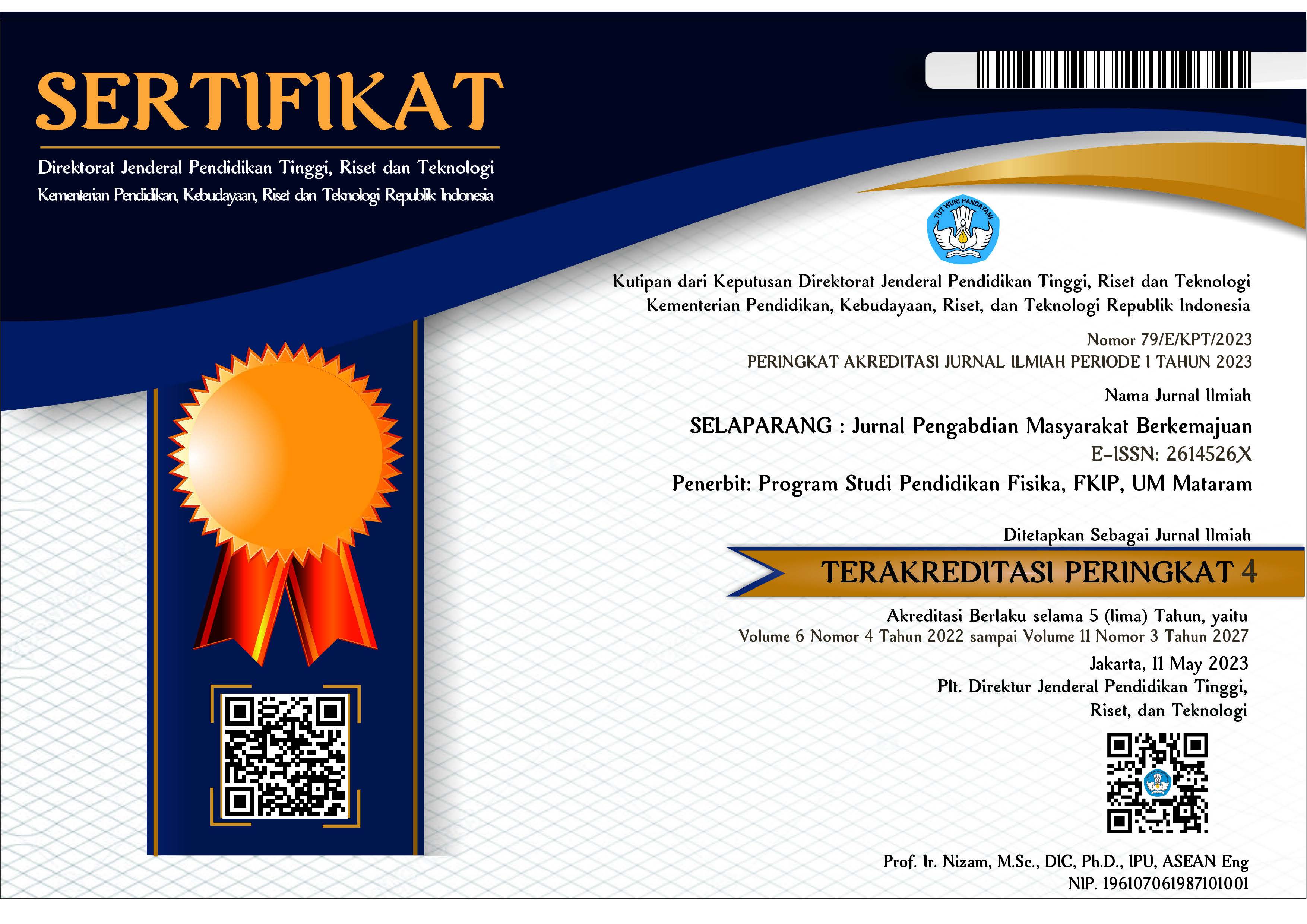Workshop perancangan infrastruktur kota ramah sepeda dengan fokus pada keberlanjutan dan mobilitas hijau Kota Palembang
Abstract
Abstrak
Workshop ini bertujuan untuk merancang infrastruktur kota yang ramah sepeda di Kota Palembang dengan fokus pada keberlanjutan dan mobilitas hijau. Menghadapi masalah kemacetan dan polusi udara akibat urbanisasi, perancangan jalur sepeda yang aman dan terintegrasi dengan transportasi umum menjadi solusi yang penting. Dalam kegiatan ini, peserta adalah mahasiswa dan pemerintah kota Palembang lebih kurang 100 orang berkolaborasi untuk menghasilkan desain jalur sepeda yang mendukung transportasi hijau, dilengkapi dengan fasilitas publik seperti parkir sepeda dan ruang hijau. Studi kasus Kota Palembang diangkat untuk menunjukkan potensi pengurangan emisi karbon dan peningkatan kualitas hidup warga melalui pengembangan infrastruktur sepeda. Hasil PKM adalah desain yang dapat diimplementasikan oleh pemerintah kota untuk mewujudkan mobilitas perkotaan yang berkelanjutan. Kasus yang diangkat dalam workshop ini adalah Kota Palembang, yang memiliki potensi besar untuk mengembangkan jaringan sepeda yang efisien guna mengurangi ketergantungan pada kendaraan bermotor. Perancangan infrastruktur ramah sepeda, diharapkan dapat tercipta budaya bersepeda di kalangan warga kota sekaligus mendukung target Kota Palembang dalam upaya pengurangan emisi karbon dan peningkatan kesehatan masyarakat. Tujuan workshop ini adalah desain infrastruktur kota ramah sepeda yang dapat diimplementasikan oleh pemerintah kota dalam rangka menciptakan mobilitas perkotaan yang lebih berkelanjutan dan hijau.
Kata kunci: perancangan infrastruktur; kota ramah sepeda; keberlanjutan; mobilitas hijau; kota palembang; urbanisasi.
Abstract
This workshop aims to design bicycle-friendly city infrastructure in Palembang City with a focus on sustainability and green mobility. Facing the problems of congestion and air pollution due to urbanization, designing safe bicycle lanes integrated with public transportation is an important solution. In this activity, participants were students and the Palembang city government, approximately 100 people collaborated to produce a bicycle lane design that supports green transportation, equipped with public facilities such as bicycle parking and green spaces. The case study of Palembang City was raised to show the potential for reducing carbon emissions and improving the quality of life of residents through the development of bicycle infrastructure. The results of the PKM are designs that can be implemented by the city government to realize sustainable urban mobility. The case raised in this workshop is Palembang City, which has great potential to develop an efficient bicycle network to reduce dependence on motorized vehicles. The design of bicycle-friendly infrastructure is expected to create a cycling culture among city residents while supporting the targets of Palembang City in efforts to reduce carbon emissions and improve public health. The purpose of this workshop is to design bicycle-friendly city infrastructure that can be implemented by the city government in order to create more sustainable and green urban mobility.
Keywords: infrastructure design; bicycle-friendly city; sustainability; green mobility; city palembang; urbanization.
Keywords
Full Text:
PDFReferences
Antón-González, Laura, Miquel Pans, José Devís-Devís, and Luis Millán González. 2023. ‘Cycling in Urban Environments: Quantitative Text Analysis’. Journal of Transport and Health 32(February). doi: 10.1016/j.jth.2023.101651.
Becker, Sophia, Dirk von Schneidemesser, Alexandre Caseiro, Katharina Götting, Seán Schmitz, and Erika von Schneidemesser. 2022. ‘Pop-up Cycling Infrastructure as a Niche Innovation for Sustainable Transportation in European Cities: An Inter- and Transdisciplinary Case Study of Berlin’. Sustainable Cities and Society 87(September). doi: 10.1016/j.scs.2022.104168.
El-Husseiny, Momen, Islam Mashaly, Nouran Azouz, Nourhan Sakr, Karim Seddik, and Samer Atallah. 2024. ‘Exploring Sustainable Urban Mobility in Africa-and-MENA Universities towards Intersectional Future Research’. Transportation Research Interdisciplinary Perspectives 26(July):101167. doi: 10.1016/j.trip.2024.101167.
Elassy, Mohamed, Mohammed Al-Hattab, Maen Takruri, and Sufian Badawi. 2024. ‘Intelligent Transportation Systems for Sustainable Smart Cities’. Transportation Engineering 16(April):100252. doi: 10.1016/j.treng.2024.100252.
Hendawy, Mennatullah, Milan Husar, Nicole Luiza Kormann da Silva, and Zainab Al Mansour. 2024. ‘Envisioning of Smart Cycling in Seven Cities: Discourse Analysis of Official City Documents’. Ain Shams Engineering Journal 15(8):102820. doi: 10.1016/j.asej.2024.102820.
Ingeborgrud, Lina, Ivana Suboticki, Marianne Ryghaug, and Tomas Moe Skjølsvold. 2024. ‘Planners as Middle Actors in Facilitating for City Cycling’. Mobilities 19(1):103–15. doi: 10.1080/17450101.2023.2186799.
Kiviluoto, Katariina, Petri Tapio, Anu Tuominen, Jari Lyytimäki, Ira Ahokas, Jonne Silonsaari, and Tim Schwanen. 2022. ‘Towards Sustainable Mobility – Transformative Scenarios for 2034’. Transportation Research Interdisciplinary Perspectives 16(January). doi: 10.1016/j.trip.2022.100690.
Lanzendorf, Martin, Clara Scheffler, Laura Trost, and Simon Werschmöller. 2022. ‘Implementing Bicycle-Friendly Transport Policies: Examining the Effect of an Infrastructural Intervention on Residents’ Perceived Quality of Urban Life in Frankfurt, Germany’. Case Studies on Transport Policy 10(4):2476–85. doi: 10.1016/j.cstp.2022.10.014.
Mehdizadeh, Milad, and Christian A. Klöckner. 2024. ‘How Emerging Modes Might Change (Sustainable) Mobility Patterns’. Transportation Research Part D: Transport and Environment 134(July). doi: 10.1016/j.trd.2024.104340.
Monga, Manan, and Shubhajit Sadhukhan. 2023. ‘Quantifying Perceived Social Benefit of Bicycle-Friendly Infrastructure in Indian Cities: Patna as a Case Study’. Journal of Cycling and Micromobility Research 1(March):100003. doi: 10.1016/j.jcmr.2023.100003.
Nieuwenhuijsen, Mark J. 2020. ‘Urban and Transport Planning Pathways to Carbon Neutral, Liveable and Healthy Cities; A Review of the Current Evidence’. Environment International 140(April):105661. doi: 10.1016/j.envint.2020.105661.
Papadakis, Dimitrios Minas, Andreas Savvides, Aimilios Michael, and Apostolos Michopoulos. 2024. ‘Advancing Sustainable Urban Mobility: Insights from Best Practices and Case Studies’. Fuel Communications 20(June):100125. doi: 10.1016/j.jfueco.2024.100125.
Sanchez-Sepulveda, Monica V., Joan Navarro-Martin, David Fonseca-Escudero, Daniel Amo-Filva, and Felipe Antunez-Anea. 2024. ‘Exploiting Urban Data to Address Real-World Challenges: Enhancing Urban Mobility for Environmental and Social Well-Being’. Cities 153(May):105275. doi: 10.1016/j.cities.2024.105275.
Stadnichuk, Vladimir, Laura Merten, Christian Larisch, and Grit Walther. 2024. ‘Optimisation of Mobility Hub Locations for a Sustainable Mobility System’. Transportation Research Interdisciplinary Perspectives 26(July):101193. doi: 10.1016/j.trip.2024.101193.
Ullmann, Daniela, Julian Kreimeier, and Harald Kipke. 2022. ‘Pedaling through a Virtually Redesigned City: Evaluation of Traffic Planning and Urban Design Factors Influencing Bicycle Traffic’. Journal of Urban Mobility 2(April):100032. doi: 10.1016/j.urbmob.2022.100032.
Wang, Lan, Kaichen Zhou, Surong Zhang, Anne Vernez Moudon, Jinfeng Wang, Yong Guan Zhu, Wenyao Sun, Jianfeng Lin, Chao Tian, and Miao Liu. 2023. ‘Designing Bike-Friendly Cities: Interactive Effects of Built Environment Factors on Bike-Sharing’. Transportation Research Part D: Transport and Environment 117(March):103670. doi: 10.1016/j.trd.2023.103670.
Wysling, Laura, and Ross S. Purves. 2022. ‘Where to Improve Cycling Infrastructure? Assessing Bicycle Suitability and Bikeability with Open Data in the City of Paris’. Transportation Research Interdisciplinary Perspectives 15(June):100648. doi: 10.1016/j.trip.2022.100648.
Yang, Yiyang, Xueying Wu, Peiling Zhou, Zhonghua Gou, and Yi Lu. 2019. ‘Towards a Cycling-Friendly City: An Updated Review of the Associations between Built Environment and Cycling Behaviors (2007–2017)’. Journal of Transport and Health 14(July). doi: 10.1016/j.jth.2019.100613.
DOI: https://doi.org/10.31764/jpmb.v8i4.27124
Refbacks
- There are currently no refbacks.

This work is licensed under a Creative Commons Attribution-ShareAlike 4.0 International License.
______________________________________________________
Jurnal Selaparang
p-ISSN 2614-5251 || e-ISSN 2614-526X
EDITORIAL OFFICE:



















